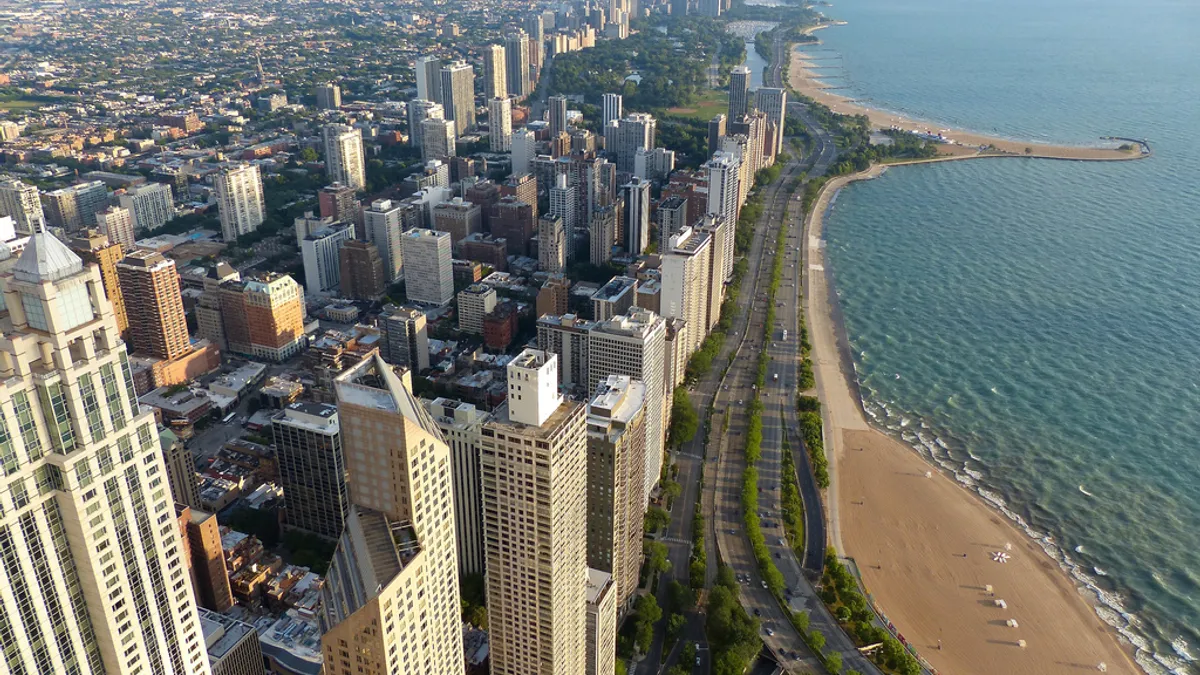Dive Brief:
- Commonwealth Edison, the electric utility serving Chicago, on Friday unveiled a series of solar policies and incentives with Illinois business and labor leaders, including a $1,000/kW rebate to residential customers who install solar and a $500/kW rebate to business customers.
- The solar proposal is a part of a package of bills supported by ComEd and its parent company Exelon now before state lawmakers. In one bill, the utility also proposes adding a demand charge for residential solar customers that clean energy advocates say could stymie rooftop solar growth in the state.
- The solar proposal announced Friday would also guarantee both interconnection and the handling of bill credits by the utility for community solar developers as well as allocate money from the state’s renewable energy fund to provide community solar to lower income customers.
Dive Insight:
Earlier this month, the president pro tempore of the Illinois General Assembly told Utility Dive that the path for any energy bill in this session is "straight uphill" due to persisting battles over the state's budget. But that didn't stop ComEd leaders on Friday from unveiling a new set of solar incentives to add to their slate of proposals before state lawmakers.
The proposed rebates for residential and business customers are part of a slate of policy proposals in three bills pushed by ComEd and Exelon. The incentives, along with the addition of solar-specific demand charges, will he help “recognize the value of solar to the grid in a way that doesn’t shift costs from customers who have solar to customers who don’t,” according to Tom O’Neil, senior vice president at the utility.
ComEd's Future Energy Plan, the bill that includes the demand charge changes, also includes a significant investment in energy efficiency. Last month, ComEd CEO Anne Pramaggiore told Utility Dive the program would allow the utility to earn a regulated rate of return on investments in efficiency, much in the way it does for traditional infrastructure spending.
“It is a new way of paying for energy efficiency that spreads the costs over a number of years and, especially in the initial years, decreases bill charges for the average customer," O'Neil said.
In another proposal, ComEd pursuing enabling legislation for the buildout of six strategically-located microgrids. They would include a 10 MW microgrid cluster in the Bronzeville neighborhood on Chicago’s southside that ComEd as well as a 17 MW microgrid system that would back up the Chicago Rockford International Airport.
Pramaggiore told Utility Dive she does not envision ComEd becoming a large player in microgrids, but that there may be a role for the utility in providing them for critical infrastructure and public service functions.
“We think there might be a role for us in what we call this critical public infrastructure, and that is a place where you can use the socialization economic tool that we have to offer a public benefit that's largely held in the public trust,” she said.
The utility is already using Department of Energy (DOE) SunShot program funding to incorporate solar into the Bronzeville microgrid. It is also using a $4 million DOE SHINES program grant to construct system infrastructure to support the planned microgrid buildout.
If approved, the solar proposal would also require Illinois regulators to do a value of solar study by 2022 to reset the rebate to solar owners.













